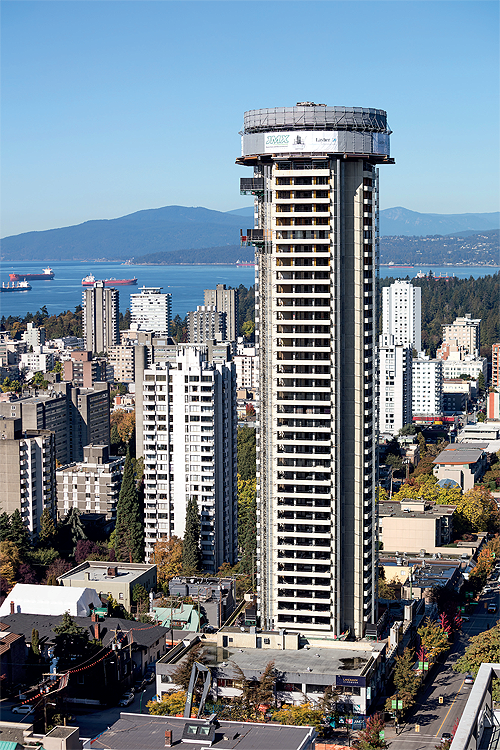
Empire’s fall
Vancouver’s Empire Landmark Hotel held the title of the city’s largest free-standing hotel for more than 40 years. Opened in 1973, the building towered 420 feet (128 meters) over Robson Street and extended a further three levels underground occupying an entire city block in the heart of downtown. Cloud 9, a revolving restaurant at the top, served guests an array of fine dining options paired with breathtaking views. With such a prime location, the hotel and restaurant quickly became a popular destination for tourists and locals alike. But when developers set their sights on revitalizing downtown Vancouver’s bustling West End, it was clear the Landmark’s time had come.
Demolishing a building on one of the city’s busiest thoroughfares — without bringing local traffic to a standstill or risking residents’ health and safety — would require creative engineering, though. JMX Contracting Inc., Canada’s premier environmental and demolition company, was ready with an innovative solution worthy of Canada’s largest building deconstruction. Using robotic demolition, JMX systematically removed 44 stories — 430,000 square feet of floor space — in 21 months.
History-making demolition
JMX identified several key factors that would make the demolition of the old hotel challenging. The high-traffic location and the potential for substantial safety risks required unique solutions to avoid impacting the daily lives of the city below. Relying on 20 years of multi-story demolition experience, JMX engineered a plan that used robotic-demolition, a ‘silent demolition’ method they’d had great success with in the past. The company commissioned two Brokk 400 Diesel machines with CC700 crushers and SB552 hammers from Brokk’s Washington state-based service fleet to work in conjunction with a Brokk 160 electric unit and a crusher they already owned.
“People assume demolition will be loud and dusty,” said Shane Macpherson, director of business and projects, for JMX West. “Historically, they’re right. But with creative engineering and today’s technology, it doesn’t have to be. We developed a plan that virtually eliminated dust and only registered 85 decibels inside the demolition zone and 70 decibels outside the hoarding. That’s six decibels quieter than ambient street traffic.”
JMX’s plan leveraged the quiet operation of the Brokk machines and CC700 attachments. In addition to reducing noise, the Brokk machines’ power-to-weight ratio addressed the building’s robust construction and floor load limits. The 6-ton Brokk 400D offered hitting power on par with a 9- to 12-ton excavator in a compact 5-foot by 14-foot (1.5-meter by 4.2-meter) footprint.
It also provided versatility — handling the 1,400-foot-pound (1,898-joule) energy class SB552 or the CC700 attachment with 278,000 foot-pounds (376,917 joules) of crushing force — allowing JMX to limit the need for additional equipment.
Empire’s end
Phase one of the demolition started in November 2017 with JMX crews stripping the entire building to bare concrete and installing mast climbers around the tower’s perimeter. After transporting equipment, materials and personnel to the top of the building, JMX converted the mast climbers into a hoarding system that safely enclosed the entire work area to trap dust, debris and noise.
With initial preparations in place, JMX faced the most challenging aspect of the Landmark demolition – the two-story Cloud 9 restaurant extending out 12 feet (3.7 meters) from the top of the tower. JMX engineered crash decks and a scaffolding system with a double layer of plywood and net hoarding to support the restaurant’s floor and roof and contain material, dust and water.
Finally, it was time to start the demolition. Systematically crushing concrete and cutting reinforcement steel, the Brokk operators maneuvered the machines through the restaurant. Standing 18 feet (five meters) away, safe from debris and dust, operators were able to use the Brokk robots’ extended range of motion — reaching 22 feet (6.7 meters) vertically and 24 feet (7.3 meters) horizontally — to crush concrete slabs, beams, walls and columns safely and efficiently. Crews then dropped the concrete down the decommissioned elevator shaft. Misters installed at various points in the elevator shaft dampened concrete debris on its way down, minimizing dust at lobby level. From there, the material was collected and transported to a staging area for further crushing before being recycled.
The Brokk method
The project picked up steam once the Cloud 9 restaurant was removed. The Brokk machines continued the demolition, completing one floor every three to four days. With each new floor, the mast climbers were lowered and tied into the tower to continue the demolition process. The Brokk machines and skid steers moved down the stairwell using a specially engineered ramp. JMX installed five floors of shores under the active demo floor — 160 shores per floor — to carry the load, ensuring the stability and safety of the building during demolition.
Using this demolition method, JMX removed 38 stories of the Empire Landmark’s tower in just nine months. Crews then used a high-reach excavator and three support excavators to remove the remaining traces of Vancouver’s Landmark.
Job Stats
Location: Vancouver, British Columbia Canada
Dates: November 2017 to August 2019
Duration: 21 Months
Material Removed: 630 tons of asbestos containing materials
Material Recycled: 40,000 tons of concrete, 2,700 tons of other recyclable materials
Equipment: 1 Brokk 160 Remote-Controlled Demolition Robot, 2 Brokk 400D Remote-Controlled Demolition Robots, Volvo 460 with 70-foot High Reach, CAT 336, 330 and 325 excavators with specialized attachments, various smaller pieces of support equipment
JMX Contracting Inc.
JMX has been delivering innovative and competitive decommissioning and environmental solutions to a wide range of industrial, institutional and commercial clients for 20 years. A nationwide presence provides clients a single source approach by offering complementary services including demolition, environmental remediation, dismantlement, metals recycling and equipment salvage.
Brokk
Brokk has been the world’s leading manufacturer of remote-controlled demolition machines and attachments for more than 40 years. Through continuous innovation in engineering and design, Brokk is able to offer unique solutions to multiple industries worldwide, including construction, demolition, mining and tunneling, cement and metal processing, nuclear and other specialty applications.
www.brokk.com